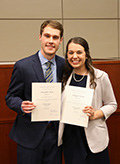 Chandler Ray ‘21 and Abigail Wood ‘21 won the 2020 Bass Berry & Sims Moot Court Competition, held at Vanderbilt Law School Feb. 7, receiving the John A. Cortner Award and a cash prize for their win.
Chandler Ray ‘21 and Abigail Wood ‘21 won the 2020 Bass Berry & Sims Moot Court Competition, held at Vanderbilt Law School Feb. 7, receiving the John A. Cortner Award and a cash prize for their win.
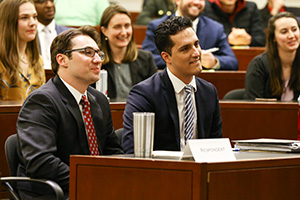 Ray and Woods faced finalists Michael Clark ’21 and Ty Trejo ’21. The competition began last fall with 57 teams and a total of 114 participants. Sasha Gombar ’21 received the award for Best Oralist, and the team of Sasha Gombar ’21 and Molly Mugford’ 21 received the award for Best Brief. Semi-finalists included 2020 class members Alicia Hoke, Madeleine Coates, Sasha Gombar and Molly Mugford.
Ray and Woods faced finalists Michael Clark ’21 and Ty Trejo ’21. The competition began last fall with 57 teams and a total of 114 participants. Sasha Gombar ’21 received the award for Best Oralist, and the team of Sasha Gombar ’21 and Molly Mugford’ 21 received the award for Best Brief. Semi-finalists included 2020 class members Alicia Hoke, Madeleine Coates, Sasha Gombar and Molly Mugford.
Under the leadership of Vanderbilt Moot Court Board Chief Justice Braden Morell ’20, Executive Justice Marcos De Hoyos ’20 managed a team of third-year students who organized and ran the competition.
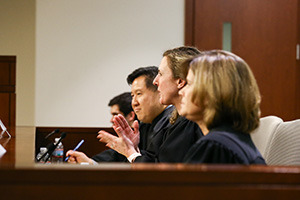 The competition’s final round was argued before a panel of three federal appellate judges, including Judge Cheryl Ann Krause of the U.S. Court of Appeals for the Third Circuit, who served as the round’s Chief Justice, Judge James C. Ho of the U.S. Court of Appeals for the Fifth Circuit, and Judge Amy J. St. Eve of the U.S. Court of Appeals for the Seventh Circuit.
The competition’s final round was argued before a panel of three federal appellate judges, including Judge Cheryl Ann Krause of the U.S. Court of Appeals for the Third Circuit, who served as the round’s Chief Justice, Judge James C. Ho of the U.S. Court of Appeals for the Fifth Circuit, and Judge Amy J. St. Eve of the U.S. Court of Appeals for the Seventh Circuit.
The 2019-20 Vanderbilt Moot Court Problem, Beezly v. United States, centered around two major issues:
- whether the Fifth Amendment of the U.S. Constitution bars the admission of a defendant’s post-arrest, pre-Miranda silence for use during the government’s case-in-chief, and
- whether a district court’s universal shackling policy of criminal defendants violates the Due Process Clause of the Fifth Amendment.
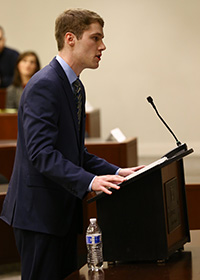 The problem, written by executive problem editor Paige Tenkhoff ’20 and associate problem editors Elizabeth Holden ’20 and Charlotte Elam ’20, followed the case of Louisa Beezly, a nurse who is stopped by the police and arrested for reckless driving. Beezly gives the officer permission to search her car, and he finds a stash of prescription oxycodone. He asks her if the drugs are hers, and she remains silent. He then reads her Miranda rights. The prosecution seeks to introduce evidence at trial of Beezly’s silence as substantive proof of guilt. She files a pretrial motion to suppress the evidence, but her motion is denied, and the evidence admitted. Beezly was convicted for possession of Schedule II narcotics.
The problem, written by executive problem editor Paige Tenkhoff ’20 and associate problem editors Elizabeth Holden ’20 and Charlotte Elam ’20, followed the case of Louisa Beezly, a nurse who is stopped by the police and arrested for reckless driving. Beezly gives the officer permission to search her car, and he finds a stash of prescription oxycodone. He asks her if the drugs are hers, and she remains silent. He then reads her Miranda rights. The prosecution seeks to introduce evidence at trial of Beezly’s silence as substantive proof of guilt. She files a pretrial motion to suppress the evidence, but her motion is denied, and the evidence admitted. Beezly was convicted for possession of Schedule II narcotics.
At sentencing, Beezy is shackled due to to a district court policy that mandated shackling for all criminal defendants at non-capital bench sentencings. She objects, but her objection is denied, and she appears before the judge in shackles.
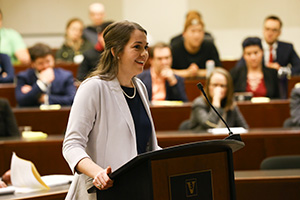 Beezly appeals her conviction on the ground that the admission of the silence evidence violated the Fifth Amendment and also appeals her sentencing on the ground that she was shackled in violation of her due process rights. The Court of Appeals affirms the district court’s holdings on both issues, holding that both the admission of the silence evidence and the district court’s blanket shackling policy were constitutional. One judge dissents, arguing that the district court should neither have admitted the evidence nor shackled Beezly. She appeals to the Supreme Court.
Beezly appeals her conviction on the ground that the admission of the silence evidence violated the Fifth Amendment and also appeals her sentencing on the ground that she was shackled in violation of her due process rights. The Court of Appeals affirms the district court’s holdings on both issues, holding that both the admission of the silence evidence and the district court’s blanket shackling policy were constitutional. One judge dissents, arguing that the district court should neither have admitted the evidence nor shackled Beezly. She appeals to the Supreme Court.
Ray and Wood argued for the petitioner, Louisa Beezly, and Clark and Trejo argued for the respondent, the United States.
The John A. Cortner Award, which goes to the winners of Vanderbilt’s annual Bass Berry & Sims Moot Court competition, honors John Cortner ’86, who served as the Moot Court Board’s chief justice. Cortner joined Bogle & Gates in Seattle after graduatio006E but was diagnosed with Hodgkin’s disease soon after and died within the year. His family endowed the award in 1988 in his memory.